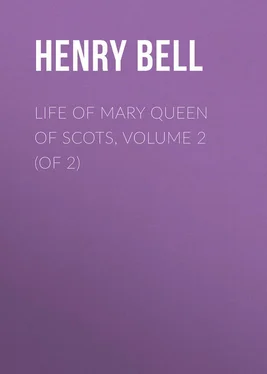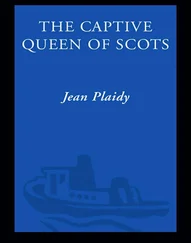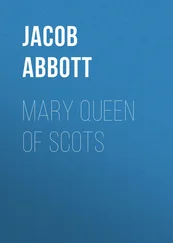Henry Bell - Life of Mary Queen of Scots, Volume 2 (of 2)
Здесь есть возможность читать онлайн «Henry Bell - Life of Mary Queen of Scots, Volume 2 (of 2)» — ознакомительный отрывок электронной книги совершенно бесплатно, а после прочтения отрывка купить полную версию. В некоторых случаях можно слушать аудио, скачать через торрент в формате fb2 и присутствует краткое содержание. Жанр: foreign_antique, foreign_prose, на английском языке. Описание произведения, (предисловие) а так же отзывы посетителей доступны на портале библиотеки ЛибКат.
- Название:Life of Mary Queen of Scots, Volume 2 (of 2)
- Автор:
- Жанр:
- Год:неизвестен
- ISBN:нет данных
- Рейтинг книги:5 / 5. Голосов: 1
-
Избранное:Добавить в избранное
- Отзывы:
-
Ваша оценка:
- 100
- 1
- 2
- 3
- 4
- 5
Life of Mary Queen of Scots, Volume 2 (of 2): краткое содержание, описание и аннотация
Предлагаем к чтению аннотацию, описание, краткое содержание или предисловие (зависит от того, что написал сам автор книги «Life of Mary Queen of Scots, Volume 2 (of 2)»). Если вы не нашли необходимую информацию о книге — напишите в комментариях, мы постараемся отыскать её.
Life of Mary Queen of Scots, Volume 2 (of 2) — читать онлайн ознакомительный отрывок
Ниже представлен текст книги, разбитый по страницам. Система сохранения места последней прочитанной страницы, позволяет с удобством читать онлайн бесплатно книгу «Life of Mary Queen of Scots, Volume 2 (of 2)», без необходимости каждый раз заново искать на чём Вы остановились. Поставьте закладку, и сможете в любой момент перейти на страницу, на которой закончили чтение.
Интервал:
Закладка:
This bond having been read and considered, all the nobles present, with the exception of the Earl of Eglinton, who went away unperceived, put their signatures to it. “Among the subscribers,” says Robertson, “we find some who were the Queen’s chief confidents, others who were strangers to her councils, and obnoxious to her displeasure; some who faithfully adhered to her through all the vicissitudes of her fortune, and others who became the principal authors of her sufferings; some passionately attached to the Romish superstition, and others zealous advocates for the Protestant faith. No common interest can be supposed to have united men of such opposite interests and parties, in recommending to their Sovereign a step so injurious to her honour, and so fatal to her peace. This strange coalition was the effect of much artifice, and must be considered as the boldest and most masterly stroke of Bothwell’s address.” It is, indeed, impossible to conceive that such a bond was so numerously subscribed on the mere impulse of the moment. Before obtaining so solemn a promise of support from so many, he must have had recourse to numerous machinations, and have brought into action a thousand interests. He must, in the first place, have influenced Morton, his brother-in-law Huntly, Argyle, and others; and having secured these, he would use them as agents to bring over as many more. The rest, finding that so formidable a majority approved of the bond, would not have the courage to stand out, for they would fear the consequences if Bothwell ever became king. Among the names attached to this bond are those of the Archbishop of St Andrews, the Bishops of Aberdeen, Dumblane, Brechin, and Ross, the Earls of Huntly, Argyle, Morton, Cassils, Sutherland, Errol, Crawfurd, Caithness, and Rothes, and the Lords Boyd, Glamis, Ruthven, Semple, Herries, Ogilvie, and Fleming. 77 77 Keith, p. 382. – There are extant two lists of the names of the subscribers, and these differ in one or two particulars from each other; but the one was only a list given to Cecil from memory by John Reid, Buchanan’s clerk; the other is a document authenticated by the subscription of Sir James Balfour, who was at the time Clerk of Register and Privy Council. The chief difference between these two copies is, that Reid’s list contains the name of the Earl of Murray, though on the 20th of April he was out of the realm of Scotland. It has been supposed that the bond, though not produced, might have been drawn up some time before, and that Murray put his name to it before going away. This is possible, but, considering Murray’s cautious character, not probable. The point does not seem one of great importance, though by those who are anxious to make out a case against Murray rather than against Bothwell, it is deemed necessary to insist upon it at length. Perhaps Bothwell forged Murray’s signature, to give his bond greater weight both with the nobles and with the Queen; although one name more or less could not make much difference either to her or them.
Here was an overwhelming and irresistible force, enlisted by Bothwell in his support. The sincerity of many of the subscribers he probably had good reason to doubt; but what he wanted was to be able to present himself before Mary armed with an argument which she would find it difficult to evade, and if she yielded to it, his object would be gained. He was afraid, however, to lay the bond openly and fairly before her; he dreaded that her aversion to a matrimonial connexion with him might weigh more powerfully than even the almost unanimous recommendation of her nobility. But having already gone so far, he was resolved that a woman’s will should not be any serious obstacle to his wishes.
The whole affair of the supper was, for a short time, kept concealed from Mary; and though Bothwell’s intentions and wishes began to be pretty generally talked of throughout the country, she was the very last to hear of them. When the Lord Herries ventured on one occasion to come upon the subject with the Queen, and mentioned the report as one which had gained considerable credit, “her Majesty marvelled,” says Melville, “to hear of such rumours without meaning, and said that there was no such thing in her mind .” Only a day or two after the bond was signed, she left Edinburgh to visit the prince her son, who was then in the keeping of the Earl of Mar at Stirling. Before she went, Bothwell ventured to express his hopes to her, but she gave him an answer little agreeable to his ambition. “The bond being once obtained,” Mary afterwards wrote to France, “Bothwell began afar off to discover his intention, and to essay if he might by humble suit purchase our good will.” – “But finding an answer nothing correspondent to his desire, and casting from before his eyes all doubts that men use commonly to revolve with themselves in similar enterprises, – the backwardness of our own mind – the persuasions which our friends or his enemies might cast out for his hindrance – the change of their minds whose consent he had already obtained, with many other incidents which might occur to frustrate him of his expectation, – he resolved with himself to follow forth his good fortune, and, all respect laid apart, either to tine all in one hour, or to bring to pass that thing he had taken in hand.” 78 78 Keith, p. 390.
This is a clear and strong statement, describing exactly the feelings both of Bothwell and Mary at this period.
The Earl did not long dally on the brink of his fate. Ascertaining that Mary was to return from Stirling on the 24th, he left Edinburgh with a force of nearly 1000 men well mounted, under the pretence of proceeding to quell some riots on the Borders. But he had only gone a few miles southward, when he turned suddenly to the west, and riding with all speed to Linlithgow, waited for Mary at a bridge over the Almond about a mile from that town. The Queen soon made her appearance with a small train, which was easily overpowered, and which indeed did not venture to offer any resistance. The Earl of Huntly, Secretary Maitland, and Sir James Melville, were the only persons of rank who were with the Queen; and they were carried captive along with her; but the rest of her attendants were dismissed. Bothwell himself seized the bridle of Mary’s horse, and turning off the road to Edinburgh, conducted her with all speed to his Castle at Dunbar. 79 79 Keith, p. 383. – Melville’s Memoirs, p. 177. – Whittaker, vol. iii. p. 106 and 356.
The leading features of this forcible abduction, or ravishment , as it is commonly called by the Scottish historians, have been greatly misrepresented by Robertson and Laing. Both of these writers mention, as a matter of surprise, that Mary yielded without struggle or regret, to the insult thus offered her. That she yielded without struggle, – that is to say, without any attempt at physical resistance, is exceedingly probable; for when was a party of a dozen persons, riding without suspicion of danger, able to offer resistance to a thousand armed troopers? There is little wonder that they were surrounded and carried off, “without opposition,” as Laing expresses it; for by a thousand soldiers, a dozen Sir William Wallaces would have been made prisoners “without opposition.” But the very number which Bothwell brought with him, and which even Mary’s worst enemies allow was not less than six hundred, proves that there was no collusion between him and the Queen. Had it been only a pretended violence, to afford a decent excuse for Mary’s subsequent conduct, fifty horsemen would have done as well as a thousand; but Bothwell knew the Queen’s spirit, and the danger of the attempt, and came prepared accordingly. But it is urged, that, if displeased, she must have expressed her resentment to those who were near her. And there is certainly no reason to suppose that she was silent, though neither Huntly nor Lethington would be much influenced by her complaints, for they had both secretly attached themselves to Bothwell. Sir James Melville, who was more faithful to the Queen, was dismissed from Dunbar the day after her capture, lest she should have employed him to solicit aid for her relief, as she had formerly done on the occasion of the murder of Rizzio. 80 80 Melville, p. 177.
Mary herself, in the letter already quoted, sets the matter beyond dispute, for she there gives a long and interesting detail, both of her own indignation, and of the arts used by Bothwell to appease it. 81 81 Keith, p. 390.
Nothing, indeed, can be more contrary to reason, than to suppose this abduction a mere device, mutually arranged to deceive the country. If Mary had really loved Bothwell and was anxious to marry him, it would have been the very last thing she would have wished to be believed, whether she thought him guilty of Darnley’s murder or not, that she gave him her hand, after he had been publicly acquitted, and all her principal nobility had declared in his favour, only in consequence of a treasonable act, committed by him against her person. If she hoped to live in peace and happiness with him, why should she have allowed it to be supposed, that she acted from necessity, rather than from choice, or that she yielded to a seducer, what she would not give to a faithful subject? This pre-arranged ravishment, would evidently defeat its own purpose, and would serve as a pretence suggested by Mary herself, for every malcontent in Scotland to take up arms against her and Bothwell. It was a contrivance directly opposed to all sound policy, and certainly very unlike the open and straight-forward manner in which she usually went about the accomplishment of a favourite purpose. “But one object of the seizure,” says Laing, “was the vindication of her precipitate marriage.” Where was the necessity for a precipitate marriage at all? Was Mary so eager to become the wife of Bothwell, with whom, according to the veracious Buchanan, she had long been indulging an illicit intercourse, that she could not wait the time required by common decency to wear her widow’s garb for Darnley? Was he barbarously murdered by her consent on the 9th of February, on the express condition that she was to have Bothwell in her arms as her husband on the 15th of May? Was she, indeed, so entirely lost to every sense of female delicacy and public shame, – so utterly dead to her own interests and reputation, – or so very scrupulous about continuing a little longer her unlicensed amours, that, rather than suffer the delay of a few months, she would thus run the risk of involving herself in eternal infamy? Even supposing that she was perfectly assured the artifice would remain undiscovered, – was her conscience so hardened, her feelings so abandoned, and her reason so perverted, as to enable her to anticipate gratification from a marriage thus hastily concluded, with so little queenly dignity, or female modesty, and with a man who was not yet divorced from his own wife? There is but one answer which can be given to these questions, and that answer comes instinctively to the lips, from every generous heart, and well-regulated mind.
Интервал:
Закладка:
Похожие книги на «Life of Mary Queen of Scots, Volume 2 (of 2)»
Представляем Вашему вниманию похожие книги на «Life of Mary Queen of Scots, Volume 2 (of 2)» списком для выбора. Мы отобрали схожую по названию и смыслу литературу в надежде предоставить читателям больше вариантов отыскать новые, интересные, ещё непрочитанные произведения.
Обсуждение, отзывы о книге «Life of Mary Queen of Scots, Volume 2 (of 2)» и просто собственные мнения читателей. Оставьте ваши комментарии, напишите, что Вы думаете о произведении, его смысле или главных героях. Укажите что конкретно понравилось, а что нет, и почему Вы так считаете.












